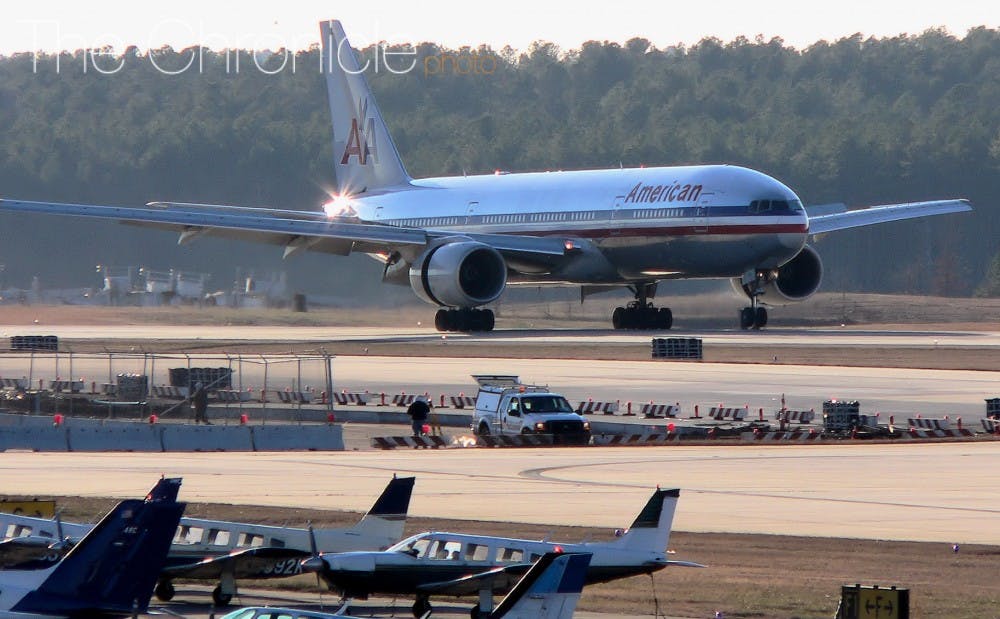The new plan for the long-term expansion of the Raleigh-Durham International Airport has been announced, to some criticism.
This Thursday, the Airport Authority Board unanimously approved Vision 2040—a long-term expansion plan focusing on RDU's terminals, airfield, ground transportation and general aviation. The plan, which aims to guide the airport for the next 25 years, includes a new runway and 23 new terminal gates. However, local opposition groups have raised concerns about the funding of the new developments.
One of Duke’s own—Michael Schoenfeld, vice president for public affairs and government relations—serves on the Master Plan Advisory Committee.
“Duke generates a tremendous amount of passenger traffic for RDU, between our students, faculty, staff, parents, alumni, patients and visitors,” Schoenfeld, who is also the air service vice chair for the Regional Transportation Alliance, explained. “The RDU leadership has been a great partner with us.”
The long term expansion plan was announced after 18 months of planning and more than 1,000 public comments were taken into account in a series of public workshops, according to a press release. Vision 2040 will incrementally introduce the changes during the next 25 years.
“Vision 2040 is an ambitious plan that ensures that RDU will continue to meet the aviation needs of our growing and thriving region,” said Michael Landguth, president and CEO of the RDU Airport Authority, in the release.
Due to Vision 2040, the airport's longest primary runway—which is nearing the end of its functional life—will be replaced with a new one close to its current location. Doing so allows the airport to make room for expanding terminals, according to the press release.
As for ground transportation, Vision 2040 includes a consolidated rental car facility, new parking facilities and additional parking space on top of the ground transportation structure.
RDU has also been expanding its international presence lately.
“One of our priorities has been to increase direct, nonstop international service from RDU, and the addition of a nonstop Delta flight to Paris, along with the longstanding nonstop American flight to London, has been a great advance for the region,” Schoenfeld wrote. “That makes RDU the only non-hub airport to have nonstop transatlantic service on two different airlines, which makes the region, and thus Duke, more accessible for international students and faculty.”
Karine Provot, a lecturing fellow in the romance studies department, said she would drive to Charlotte to take a direct flight to France during the summer before the direct flight to Paris was introduced.
“I think it’s probably going to make it easier, not just for me to go to France, but for some of my family in France to come visit me,” she said. “They don’t speak English, so it was a concern when you had a connection. But now that there is a direct flight it is easy for me to tell them, ‘Just take this flight and I’ll be right there to pick you up at the airport.’”
The increased emphasis on international connectivity is not limited to Europe. RDU hopes to add a nonstop flight to Asia at some point in the future, Schoenfeld noted.
Developing the land
Vision 2040 has not gone without criticism, however.
An aspect of the plan that has drawn the ire of local opposition groups is how the airport intends to fund the construction—by developing Lake Crabtree Park and creating a rock quarry in the land bordering William B. Umstead State Park.
Natalie Lew, a resident of the Triangle region since 1980, is a member of A Better Vision RDU, one of the groups that is urging the airport's board to consider different funding.
“I come at this from all angles. I own some land on the other side of Umstead State Park, and I’m also a frequent business traveler,” she said. “I’ve seen how that park has grown and all of the effort we put into building it and the volume of use it gets. It’s an important feature for our area, and we need to step up efforts to save it.”
Several groups—including Triangle Off-Road Cyclists, the Umstead Coalition and A Better Vision—have suggested turning the areas into outdoor commercial trail centers that the airport could profit from without developing the land.
“We do not oppose the airport’s master plan Vision 2040," David Anderson, a member of TORC, said. "What we do oppose is a portion of it where they are monetizing the land to pay for it."
Get The Chronicle straight to your inbox
Signup for our weekly newsletter. Cancel at any time.
Bre is a senior political science major from South Carolina, and she is the current video editor, special projects editor and recruitment chair for The Chronicle. She is also an associate photography editor and an investigations editor. Previously, she was the editor-in-chief and local and national news department head.
Twitter: @brebradham
Email: breanna.bradham@duke.edu

